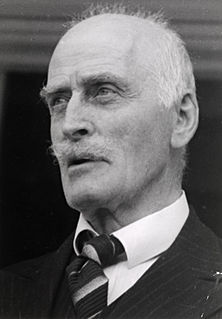A Quote by Humphry Davy
Cuvier had even in his address & manner the character of a superior Man, much general power & eloquence in conversation & great variety of information on scientific as well as popular subjects. I should say of him that he is the most distinguished man of talents I have ever known on the continent: but I doubt if He be entitled to the appellation of a Man of Genius.
Related Quotes
It is not every man who can be a Christian, even in a very moderate sense, whatever education you give him. It is a matter of constitution and temperament, after all. He may have to be born again many times. I have known many a man who pretended to be a Christian, in whom it was ridiculous, for he had no genius for it. It is not every man who can be a free man, even.
Great men are excellent topics of conversation, but the superior man, the superior men, the masters, the universal spirits on horseback, have to stop and search their memories merely to know who these so-called great men might be. And so the great man is left with the crowd, the worthless majority...for his admirers.
The book, the college, the school of art, the institution of any kind, stop with some past utterance of genius. . . . They look backward and not forward. But genius looks forward: the eyes of man are set in his forehead, not in his hindhead: man hopes: genius creates. Whatever talents may be, if the man create not, the pure efflux of the Deity is not his; - cinders and smoke there may be, but not yet flame.
Success is in the student, not in the university; greatness is in the individual, not in the library; power is in the man, not in his crutches. A great man will make opportunities, even out of the commonest and meanest situations. If a man is not superior to his education, is not larger than his crutches or his helps, if he is not greater than the means of his culture, which are but the sign-boards pointing the way to success, he will never reach greatness. Not learning, not culture alone, not helps and opportunities, but personal power and sterling integrity, make a man great.
The power, indeed, of every individual is small, and the consequence of his endeavours imperceptible, in a general prospect of the world. Providence has given no man ability to do much, that something might be left for every man to do. The business of life is carried on by a general co-operation; in which the part of any single man can be no more distinguished, than the effect of a particular drop when the meadows are floated by a summer shower: yet every drop increases the inundation, and every hand adds to the happiness or misery of mankind.
There is something in the eloquence of the pulpit, when it is really eloquence, which is entitled to the highest praise and honour. The preacher who can touch and affect such an heterogeneous mass of hearers, on subjects limited, and long worn thread-bare in all common hands; who can say any thing new or striking, any thing that rouses the attention, without offending the taste, or wearing out the feelings of his hearers, is a man whom one could not (in his public capacity) honour enough.
For a man's property is not at all secure, though there be good and equitable laws to set the bounds of it, between him and his fellow subjects, if he who commands those subjects, have power to take from any private man, what part he pleases of his property, and use and dispose of it as he thinks good.
In his scientific genius, man has wrought material miracles and has transformed his world. He has harnassed nature and has developed great civilizations. But he has never learned very well how to live with himself. The values he has created have been predominantly materialistic; his spiritual values have lagged far behind. He has demonstrated little spiritual genius and has made little progress toward the realization of human brotherhood. In the contemporary atomic age, this could prove man's fatal weakness.
Closing down in the midst of pain is a denial of a man's true nature. A superior man is free in feeling and action, even amidst great pain and hurt. If necessary, a man should live with a hurting heart rather than a closed one. He should learn to stay in the wound of pain and act with spontaneous skill and love even from that place.
Roger Casement is an intriguing figure - humanitarian, Irish revolutionary, gay - and much had and would be written about him, there was something about his character as a conflicted man, an Irish Protestant who spent much of his time representing England in different African nations, a gay man who, true to the times, kept his sexual orientation to himself, that kept playing in my head. I read on and around him, but a historical figure is not a story - it's not even a character - so my story, the one that I would develop into Valiant Gentlemen, had yet to reveal itself.
Existential psychotherapy is the movement which, although standing on one side on the scientific analysis owed chiefly to the genius of Freud , also brings back into the picture the understanding of man on the deeper and broader level man as the being who is human. It is based on the assumption that it is possible to have a science of man which does not fragmentize man and destroy his humanity at the same moment as it studies him. It unites science and ontology .




































